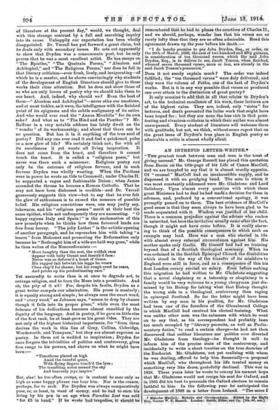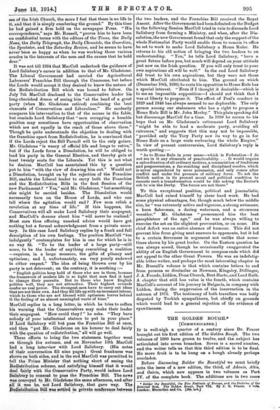'AN INTREPID LETTER-WRITER.* "Tun greatest trait between man and man
is the trust of giving counsel." Mr. George Russell has placed this quotation from Bacon on the title-page of hie Life of Canon MacColl,
• and we are tempted to say that it is almost Cruelly apposite. Of " counsel " M8.'60011' had an inexhaustible supply, and he dispensed it with no grudging band. The men to whom it was most constantly addressed were Mr. Gladstone Mid Lord Salisbury. Upon almost every question with which these great Ministers had to deal he bid mats decision for them in advance, and, prefaced by a conventional apology, it was promptly passed on to them. The best evidence of MacColl's good sense is that they seem always to have been glad to be made acquainted with it. _Wisdom was justified of .her There is a common prejudice against the adviser who rushes in uninvited, hut here the invitation usually came after the fact, though it might not have come before. It is really alarm- ing to think of the poaiiible consequences to which such an example may lead. Here was a men who started in life with almost every external circitimslance against him. His mother spoke only Gaelic. He himself had had no training beyond that of a Scottish theological seminary. When he was ordained in the Scottish Episeopal oliurch the disabilities which stood in the way of the transfer of its ministers to England were still in force, and aria consequence of this his first London curacy mirried no Salary. Even before making this migration be had written to Mr. Gladstone atiggesting that a naval chaplaincy,. or a tutorship or chaplaincy in a family would be very welcome to a young clergyman just dis- missed by his Bishop for taking what that Bishop thought the wrong side in a theological controversy then raging in episcopal Scotland. So far tho letter might have been written by any man in his position, for Mr. Gladstone had been one of the founders of the Glenalmond College in.which Mitt-Coll had received his clerical-training; What was unlike other men was the calmness with which he went on to say that, as his correspondent had probably been too Much occupied by "literary pursuits, as well as Parlia. mentary duties," to read a certain charge—he had not then discovered that neither literature nor politics ever diverted Mr. Gladstone from theology—he thought it well to inform him of the precise state of the controversy, and incidentally to write a short treatise on thelrue doctrine of the Eucharist. Mr. Gladstone, not yet realizing with whom he was dealing, offered to help him financially—a proposal which MacColl, who throughout his life treated money as something very like dross, gratefully declined. This was in 1858. Three years later he wrote to convey his earnest hope that Mr. Gladstone would not resign his seat for Oxford, and in 1865 did his best to persuade the Oxford electors to remain faithful to him. In the following year he anticipated the development of 1868 in a letter from Ireland. "The more I • Natant MasCods Memoirs and Correspondence. Edited by the ISOM Hon. George W. 5, 5essoll. Londe; Smith, Elder, and Co. cis. ed. set.)
• -
see of the Irish Church, the more I feel that there is no life in it, and that it is simply cambering the ground." By this time he had gained a firm hold on the newspaper Press. "His correspondence," says Mr. Russell, "proves him to have been on confidential terms with the editors of the Times, the Daily News, the Daily Telegraph, the Daily Chronicle, the Guardian, the Spectator, and the Saturday Review, and he seems to have never been so happy as when he was working these various oracles in the interests of the men and the causes that he held dear."
It was not till 1884 that MacColl undertook the guidance of Lord Salisbury's career in addition to that of Mr Gladstone. The Liberal Government had carried the Agricultural Labourers' Franchise Bill through the Commons, but before the Lords would accept it they desired to know the nature of the Redistribution Bill which was bound to follow. On July 7th MacColl disclosed to the Conservative leader hie long-cherished dream of seeing him "at the head of a great party (when Mr. Gladstone retired) combining the best elements of Conservatism and Liberalism." He modestly compares his intervention to that of the mouse in the fable, but reminds Lord Salisbury that "men occupying a humble position may sometimes have opportunities of observation which are not equally in the reach of those above them." Though he quite understands the objection to dealing with the franchise apart from Redistribution, be is convinced that if the Lords reject the Bill Parnell will be the only gainer. Mr. Gladstone "is weary of official life and longs to retire," but if the Lords force a Dissolution, he will be obliged to lead his party in the General Election, and thereby gain at least twenty seats • for the Liberals. Yet this is not what he desires. MacColl has ascertained this by a question put to him "with the view of drawing him out." Would not a Dissolution, brought on by the rejection ot the Franchise Bill, enable the Liberal leader to carry both the Franchise and the Redistribution Bills in the first Session of the new Parliament? "Yes," said Mr. Gladstone, " but something else might be carried besides. The Dissolution would necessarily turn on the House of Lords, and who cun tell where the agitation would end ? Few men relish a revolution at my time of life." If this happens, the Conservatives will all make Lord Salisbury their scapegoat, and MacColl's dreams about him "will never be realized," Most men thus offering unasked advice would have got nothing but a formal acknowledgment from a private secre- tary. In this case Lord Salisbury replies by a frank and full deacription of his own feelings. The position MacColl "too indulgently" contemplates for him is one for which be is in no way fit. "To be the leader of a large party—still more, to be the leader of anything resembling a coalition —requires, in a large measure, the gifts of pliancy and optimism; and I, unfortunately, am very poorly endowed in either respect." The idea of being thrown over by his party is not deterrent; on the contrary, it is soothing :— "English polities keep hold of those who are in them, because the framework of modern life is so tight that men find it hard to Change their pursuits. But to those who know English polities well, they are not attractive. Their highest rewards confer no real power. The strongest men have to carry out ideas that are not their own. And they fill life up with an incessant labour, which to those who are not blessed with optimism leaves behind it the feeling of an almost unmingled waste of time."
MacColl replies in a long letter, in which he tries to soften his warning that the Conservatives may make their leader their scapegoat. "Bow could they?" he asks. "They have nobody of your intellectual stature to put in your place." If Lord Salisbury will but pass the Franchise Bill at once, and then "put Mr. Gladstone on his honour to deal fairly with the question of redistribution," all will go well.
These efforts to bring the two statesmen together went on through the autumn, and on November 13th MacOoll had a long interview with Lord Salisbury. (Hie notes of their conversation fill nine pages.) Great frankness was ehovin on hi:4h sides, and in the end MacCoR was permitted to tell the Prime Minister that nothing short of seeing the 'Redistribution scheme, and satisfying himself that it would deal fairly with the Conservative Party, would induce Lord Salisbury to consent to pass the Franchise Bill. The news was conveyed to Mr. Gladstone the same afternoon, and after pli it was he, not Lord Salisbury, that gave way. The It.9.4klqibgioR 140 7./845 P94194 * PriY_84.9 004eM99 P47.P.4 the two leaders, and the Franchise Bill received the Royal Assent. After the Government had been defeated on the Budget in the following Session MacColl tried in vain to dissuade Lord Salisbury from forming a Ministry, and when, after the Dis- solution, the new Government found that only the support of the whole Nationalist Party would enable them to remain in office he set to work to make Lord Salisbury a Home Ruler. He returns to his old notion of bringing the two leaders to an understanding. "You," he tells Lord Salisbury, "have a great future before you, but much will depend on your attitude just now on the Irish question. If you will only trust to your own aspirations all will be well." In the end Lord Salisbury did trust to his own aspirations, but they were not those which MacColl attributed to him. The ground on which (December 10th, 1886) be rests his opposition to Home Rule has a special interest. "Even if I thought it desirable—which is to me an impossible supposition—I should not think that I was at liberty to propose it. The effect of Peel's conduct in 1829 and 1846 has always seemed to me deplorable. The only person among our statesmen who has a right to propose a Home Rule Bill is Mr. John Morley." This plain speaking did but discourage MacColl for a time. In 1889 he recurs to his hope that on Mr. Gladstone's retirement Lord Salisbury "might be able to lead a moderate party, avoiding all extremes," and suggests that this may not be impossible, " provided only the Tory Party saw its way to go in for Home Rule on a large scale embracing the whole Empire." In view of present controversies, Lord Salisbury's reply is worth quoting :—
" As to Home Rule in your sense—which is Federation—I do not Flee in it any elements of practicability.... It would require a subordination of all ordinary motives, a renunciation of traditions and prepossessions, a far-reaching and disciplined resolve, which *never engendered by mere persuasion, and only comes after conflict and under the pressure of military force. To ask the British nation in its present moral and political condition to execute such a transformation would be like asking the Rector's cob to win the Derby. The forces are not there."
To this exceptional position, political and journalistic, MacOoll had raised himself by sheer hard work. He had some physical advantages, for, though much below the middle size, he " was extremely active and vigorous, a strong swimmer, a keen fisherman, a daring waterman, and a strenuous wrestler." Mr. Gladstone "pronounced him the best pamphleteer of the age," and he was always willing to exercise the art on the slightest provocation, or on none. His chief defect was an entire absence of humour. This did not prevent him from giving neat answers to opponents, but it led to a certain fierceness in argument not unlike that some.. times shown by his great leader. On the Eastern question he was always sound, though he occasionally exaggerated the ability of an English Government to compass ends which did not appeal to the other Great Powers. He was an indefatig- able letter-writer, and perhaps the most interesting chapter in Mr. Russell's volume is that which contains letters to and from persons so dissimilar as Newman, Kingsley, Diillinger, J. A. Fronde, Liddon, Dean Church, Bret Haile, and Lord Bath. A chapter that still has value is the fourth, which containii MacColl's account of his journey in Bulgaria, in company with Liddon, during the suppression of the insurrection in the autumn of 1875. The testimony of both travellers was hotly disputed by Turkish sympathisers, but chiefly on grounds which would lead to a general rejection of the eviclence of eyewitnesses.











































 Previous page
Previous page